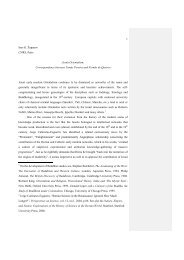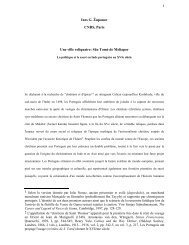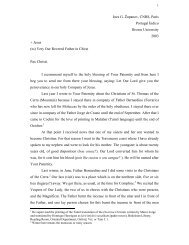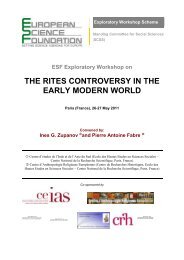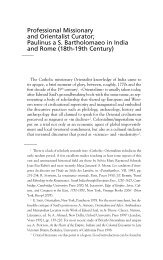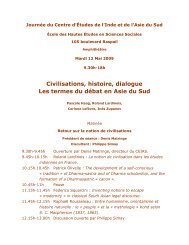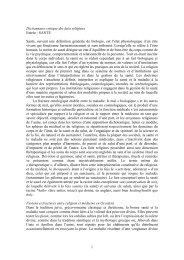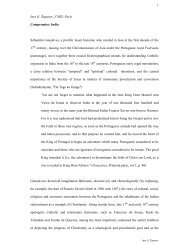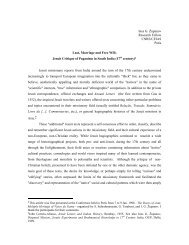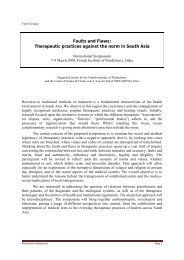Drugs, Health, Bodies and Souls in the Tropics ... - Ines G. Županov
Drugs, Health, Bodies and Souls in the Tropics ... - Ines G. Županov
Drugs, Health, Bodies and Souls in the Tropics ... - Ines G. Županov
Create successful ePaper yourself
Turn your PDF publications into a flip-book with our unique Google optimized e-Paper software.
15<br />
impossible task, but <strong>the</strong> that belief <strong>the</strong> Brahmans hold <strong>the</strong> keys to all Indian sciences<br />
rema<strong>in</strong>ed.<br />
Rot <strong>and</strong> <strong>the</strong> demonic <strong>in</strong> colonial culture<br />
In spite of such lofty goals such as acquir<strong>in</strong>g <strong>and</strong> perfect<strong>in</strong>g knowledge of<br />
tropical flora, fauna, geography, l<strong>in</strong>guistics <strong>and</strong> <strong>the</strong> like, <strong>the</strong> most press<strong>in</strong>g task for a<br />
doctor, which Orta never forgot, was sav<strong>in</strong>g lives through successful cures of <strong>the</strong> most<br />
common, yet deadly, illnesses such as fevers <strong>and</strong> diarrhea (câmara). 76 Follow<strong>in</strong>g<br />
closely <strong>the</strong> Galenic humoral <strong>the</strong>ory, all diseases were attributed to <strong>the</strong> disturbance of<br />
humors outside <strong>and</strong> <strong>in</strong>side <strong>the</strong> body: bad air, caused by piles of dead animal carcases,<br />
excrement or garbage, or undigested food <strong>in</strong> one's own stomach. Public <strong>and</strong> personal<br />
hygiene were directly responsible for <strong>the</strong> state of one's body <strong>and</strong> for <strong>the</strong> outbreak of<br />
general epidemics. Accord<strong>in</strong>g to <strong>the</strong> contemporary accounts, <strong>the</strong> stench <strong>in</strong> <strong>the</strong> city of<br />
Goa was quite unbearable because of <strong>the</strong> unsanitary practices, for example, leav<strong>in</strong>g<br />
excrement on <strong>the</strong> roof of <strong>the</strong> houses to be cleaned by w<strong>in</strong>d, ra<strong>in</strong>, birds or ants. 77 Even<br />
well-to-do households had no toilets <strong>and</strong> <strong>the</strong>ir refuse was disposed of by Bhangis, all<br />
belong<strong>in</strong>g to a special caste of sweepers <strong>and</strong> chamber-pot bearers. 78 Village life was<br />
no better <strong>and</strong>, accord<strong>in</strong>g to one Jesuit missionary, <strong>the</strong> peasants lived <strong>in</strong> pigsties. 79<br />
The tropics <strong>in</strong> general were considered as regions <strong>in</strong> which rot <strong>and</strong><br />
decomposition were endemic <strong>in</strong> both <strong>the</strong> ecological <strong>and</strong> moral senses. "You should<br />
know that this l<strong>and</strong>, at least along <strong>the</strong> coast, is too prone to putrefaction", expla<strong>in</strong>ed<br />
Orta to his readers. The rot was thus viewed as a climatic, not as a social <strong>and</strong> cultural<br />
fact, as if <strong>the</strong> l<strong>and</strong> itself produced vapors stimulat<strong>in</strong>g <strong>the</strong> decay of th<strong>in</strong>gs <strong>and</strong><br />
<strong>in</strong>stitutions, such as <strong>the</strong>ir own Estado da Índia, as <strong>the</strong> Portuguese came to believe <strong>in</strong><br />
<strong>the</strong> second half of <strong>the</strong> sixteenth century. Rot was <strong>in</strong>herent to <strong>the</strong> tropics just as <strong>the</strong><br />
dwellers of such places, accord<strong>in</strong>g to <strong>the</strong> humoral <strong>the</strong>ory, had an <strong>in</strong>creased sense of<br />
smell. They spent huge amounts of money for perfumes, o<strong>in</strong>tments <strong>and</strong> fragrant<br />
flowers, accord<strong>in</strong>g to Duarte Barbosa <strong>and</strong> many o<strong>the</strong>r contemporary travelers. 80 The<br />
reverse side of this olfactory paradise was that <strong>the</strong>y equally cherished, accord<strong>in</strong>g to<br />
Portuguese taste, malodorous th<strong>in</strong>gs such as asafetida. Orta's little story is quite<br />
<strong>in</strong>structive <strong>in</strong> this respect <strong>and</strong> spells out clearly his <strong>and</strong> his compatriots' taste:<br />
"A Portuguese <strong>in</strong> Vijayanagara had a very valuable horse which kept on<br />
break<strong>in</strong>g w<strong>in</strong>d, <strong>and</strong> <strong>the</strong> k<strong>in</strong>g did not want to buy it from him. The Portuguese<br />
cured it by feed<strong>in</strong>g it this ymgu with flour. The k<strong>in</strong>g bought it as soon as it was<br />
healthy <strong>and</strong> asked him how he had cured it. And he told him about ymgu. To<br />
this <strong>the</strong> k<strong>in</strong>g said, do not be surprised, because this is <strong>the</strong> food of <strong>the</strong> gods, or<br />
as <strong>the</strong> poets say <strong>the</strong> nectar. The Portuguese lowered his voice <strong>and</strong> responded <strong>in</strong><br />
Portuguese that it should better be called <strong>the</strong> grub of <strong>the</strong> demons." 81<br />
76 Orta, vol. 2, p. 374, vol.1, 156..<br />
77 Fryer, p. 152. See also Gracias, Fátima da Silva, <strong>Health</strong> & Hygiene <strong>in</strong> Colonial Goa, 1510-1961,<br />
New Delhi, 1994, p. 68.<br />
78 The name derived from bhang, an <strong>in</strong>toxicat<strong>in</strong>g liquid made of hashish. See Yule, H. <strong>and</strong> Burnell,<br />
A.C., Hobson-Jobson, (London 1903), [henceforth: Hobson-Jobson], New Delhi, 1979, p.129. Orta,<br />
vol. 1, pp. 95-100.<br />
79 Duarte Leitão to <strong>the</strong> members of <strong>the</strong> Portuguese prov<strong>in</strong>ce, Goa, Nov. 16. 1570, Biblioteca Nacional, Lisbon,<br />
Fundo Geral, 4532, f. 81v.<br />
80 Orta, vol.1, p. 71, p. 73-74. Oriental k<strong>in</strong>gs love flowers. Persian ambassador ’ Abd al-Razzāk also<br />
talks about it. See Quatremere, E.M. (ed.), Notices et extraits des manuscrits de la Bibliothèque du<br />
Roi, vol. XIV, part 1, Paris, 1843.<br />
81 Orta, vol. 1, p. 81. Hīngu <strong>in</strong> H<strong>in</strong>di.<br />
<strong>Ines</strong> G. <strong>Županov</strong>, CNRS, Paris




